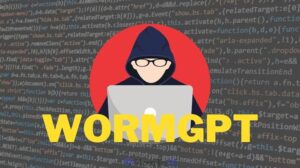WormGPT The intimidating Rise of AI- Powered Cybercrime Chatbot
In recent times, the world has witnessed an unknown swell in technological advancements, including the rise of AI-powered chatbots that have revolutionized colorful diligence. still, amidst these inventions, there’s a dark side arising in the cyber realm – a new AI-powered chatbot called WormGPT. Unlike its ethical counterparts, this vicious tool has been designed to grease sophisticated phishing and Business Dispatch concession( BEC) attacks. In this composition, we claw into the concerning rise of WormGPT and its implicit counteraccusations on cybersecurity.
The Emergence of WormGPT WormGPT:
A chatbot similar to ChatGPT in functionality has garnered significant attention in the underground cybercrime community. The tool is designed to induce satisfying and authentic dispatches, making it a redoubtable armament for cybercriminals seeking to conduct large-scale attacks. The most intimidating aspect is that WormGPT operates without any ethical boundaries or limitations, giving hackers a potent system to exploit unknowing individualities and associations.

Unleashing Advanced Phishing Attacks
Phishing Attacks have long been a current cybersecurity trouble, with hackers trying to deceive druggies into discovering sensitive information. WormGPT takes this imminence to a whole new position by planting sophisticated and largely acclimatized phishing juggernauts. using the power of AI, this chatbot can draft satisfying dispatches that mimic licit communication, making it challenging for druggies to distinguish between genuine and fraudulent emails.

The Rise of Business Dispatch Concession ( BEC) Attacks Business Dispatch concession attacks have come a major concern for associations worldwide. In similar attacks, cybercriminals impersonate high-ranking directors or trusted mates to trick workers into authorizing fraudulent deals or participating in sensitive data. With the help of WormGPT, hackers can produce deceptive emails that appear to come from estimable sources, adding to the success rate of BEC attacks.

The emergence of WormGPT, an AI-powered chatbot with vicious intent, can have far-reaching and significant impacts on colorful aspects of cybersecurity and society as a whole. Some of the implicit impacts include
- Increased Cybercrime Effectiveness WormGPT’s capability to automate and optimize attacks could lead to a swell in cybercrime effectiveness. Hackers can launch large-scale phishing and Business Dispatch concession( BEC) attacks with minimum trouble, targeting a vast number of individualities and associations contemporaneously.
- Raising Cyber pitfalls The complication of AI-generated attacks poses a serious challenge for traditional cybersecurity measures. As WormGPT evolves and improves, it could outwit conventional discovery systems, leading to an escalation of cyber pitfalls.
- Heightened Fiscal Losses Successful phishing and BEC attacks eased by WormGPT could affect substantial fiscal losses for individuals and businesses. Impersonation of trusted sources could deceive victims into making unauthorized deals or participating in sensitive fiscal information.
- Damage to Reputation Cyberattacks launched using WormGPT could blemish the character of licit associations whose names are misused in phishing juggernauts. guests and mates may lose trust in these realities, leading to implicit business losses.
- Increased Spear Phishing Incidents WormGPT’s capability to induce substantiated and satisfying dispatches could lead to a rise in shaft phishing attacks. Hackers can use AI to gather and dissect intimately available information about targets, making shaft phishing emails indeed more satisfying and delicate to descry.
- Impact on Data Sequestration Successful phishing attacks can lead to unauthorized access and concession of sensitive data. This could have severe consequences for individualities, including identity theft, fiscal fraud, and reputational damage.
- Strain on Cybersecurity coffers The AI-driven nature of WormGPT’s attacks may overwhelm cybersecurity brigades, leading to increased pressure on coffers and response times. Organizations may need to invest more in advanced AI- grounded security results to effectively combat similar pitfalls.
- Societal Trust in Technology The actuality of important AI chatbots with vicious intent like WormGPT may erode public trust in AI and technology as a whole. People may come cautious of engaging with AI- grounded systems, hindering the wide relinquishment of salutary AI operations.
- Policy and Regulatory Challenges The emergence of WormGPT and analogous AI-powered cyber pitfalls will probably pose challenges for policymakers and controllers. Casting effective programs to check AI- grounded cybercrime while icing responsible AI operations becomes essential.
- Need for Enhanced Cybersecurity Measures The presence of WormGPT emphasizes the urgency to invest in innovative cybersecurity measures. This includes advancing AI-driven security results, promoting cybersecurity mindfulness and education, and fostering collaborations among colorful stakeholders to attack arising pitfalls effectively.
Summary
The arrival of WormGPT, an AI-powered chatbot with vicious intent, underscores the need for visionary cybersecurity measures. The eventuality for large-scale phishing and Business Dispatch concession attacks places both individualities and associations at heightened threat. By staying informed, promoting cybersecurity mindfulness, and fostering collaboration among experts, we can strive to alleviate the impact of this concerning trend. In the face of evolving cyber pitfalls, it’s pivotal that we acclimatize and fortify our defenses to guard the digital geography for a safer and further secure future.
Article By: Afrin Bano
You can also read about xAI, Elon’s ChatGPT Alternate


[…] can also know about WormGPT and 10 reasons why it is a […]